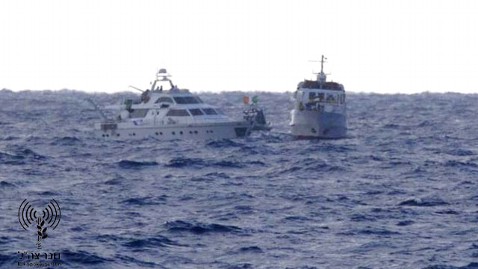Israel Blocks Activist Ships From Entering Gaza

The Israeli military intercepted two boats carrying activists to Gaza.
TEL AVIV Two boats carrying pro-Palestinian activists were stopped by Israel’s navy on Friday as they tried to sail to the Gaza Strip and break Israel’s naval blockade. The white motoryachts were boarded after a radio exchange and were led to a port in Israel’s southern city of Ashdod. There were no reports of clashes or injuries.
“Following [the activists'] unwillingness to cooperate, and after ignoring calls to divert to the port of Ashdod, the decision was made to board the vessels and lead them there,” Israel’s military said in a statement.
The Canadian boat, the Tahrir (“liberation” in Arabic), and the Irish boat, Saoirse (“freedom”), called their effort “Freedom Waves,” sailing from Turkey on Wednesday with 27 international activists, journalists and crew on board.
“Israel has caged Palestinians in Gaza and the West Bank, prohibiting physical contact between us,” Palestinian student Majd Kayyal said in a statement from the Tahrir on Wednesday. “We want to break the siege Israel has imposed on our people.”
Israel responded quickly, saying the navy would block the small flotilla’s attempts to break the blockade around Gaza. Israel Defense Forces spokeswoman Avital Liebovich accused the boats of provocation, even referring to them as “provocatilla” on Twitter.
Video released by the IDF showed the Israeli navy communicating by radio with the boats, informing them of their breach of the blockade. Commandos then approached in smaller boats and used water cannon before finally boarding.
Aside from the passengers, the two boats carried a “symbolic cargo” of $30,000 worth of medicine. But when asked by the Israeli ships that met them what cargo the boats were carrying, a member of the group said they weren’t carrying any.
In addition to the land blockade around Gaza that tightly controls the flow of goods and people, there has been a maritime blockade around Gaza since 2009. Israel argues it is necessary to prevent weapons from being smuggled into Gaza for Hamas and other militant Islamist groups; critics say the blockade violates human rights.
In early September, the United Nations published the Palmer report, which said the maritime blockade is justifiable under international law.
The report studied the far more violent boarding of a Gaza-bound flotilla in May 2010, when Israeli commandos boarded ships coming from Turkey, leaving nine Turkish activists dead.
Following an international outcry, Israel said they were acting in self-defense. The Palmer report found that the commandos met an “organized and violent resistance from a group of passengers” but that they responded with “excessive and unreasonable force.” Relations between Turkey and Israel plummeted as Israel refused to officially apologize for the incident.
A second flotilla was organized to sail from Greece to Gaza in June, but a combination of suspicious malfunctions and the Greek coast guard blocking boats from leaving port ended those efforts. Activists accused Israel of sabotage and of pressuring the Greek government.
In Gaza on Friday, Hamas Prime Minister Ismail Haniyeh told passengers on the boats, “Your message has been delivered whether you make it or not…. The siege is unjust and must end,” he said, according to The Associated Press.
Activists say they will continue to try to sail to Gaza in the near future “to send the world and public opinion the message that Gaza is still under siege,” Huwaida Arraf from the Free Gaza Movement’s told Israel’s Haaretez newspaper. “The next boats will be launched in an organized manner, wave after wave, under the name Flotilla Waves of Freedom.”